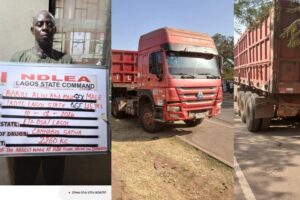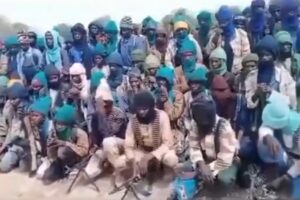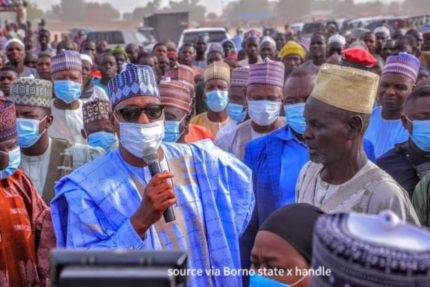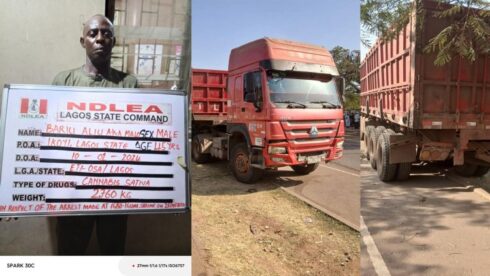In a decisive move to address corruption in Bama IDP Camp and ensure accountability in humanitarian efforts, Governor Babagana Prof Zulum has taken action against alleged malpractice within the Bama Internally Displaced Persons (IDPs) camp. The Governor Zulum has sacked the camp Chairman of the State Emergency Management Agency, Abbah Tor, following accusations of collusion in diverting essential Water, Sanitation, and Hygiene (WASH) facilities meant for the camp’s residents. During his recent visit to the Bama IDPs camp, Governor Zulum personally supervised the distribution of relief materials and subsequently expelled Abbah Tor from the camp, publicly shaming him for his alleged misconduct.
Allegations of Misappropriation against Abbah Tor
Reports from opitanglobamedia have shed light on the disturbing allegations of misappropriation within the Bama IDPs camp. It is reported that humanitarian officials, including Abbah Tor, conspired to divert approximately 30 borehole tanks and iron stands intended for installation within the Bama IDP camp. These items, generously provided by UNICEF, were essential for ensuring access to safe water and sanitation facilities for the displaced population. However, their diversion has exacerbated the already dire living conditions in the camp, forcing women and children to resort to open defecation due to the scarcity of water.
UNICEF’s Efforts and Challenges
Despite UNICEF’s commendable efforts to improve water and sanitation infrastructure in Bama, challenges persist due to acts of sabotage and corruption. UNICEF’s intervention aimed to provide safe water access to over 115,204 IDPs and facilitate sanitation through the construction of latrines and hand washing stations. However, opitanglobamedia investigations reveal a concerning reality where only a fraction of the planned boreholes have been installed, with many failing to dispense water. The diversion of vital WASH resources underscores the urgent need for greater oversight and accountability to ensure that humanitarian aid reaches those in need without interference or corruption.
Water Scam Unveiled in Bama IDP Camp: The Betrayal of Trust
In a shocking revelation, a clandestine operation to divert and sell water facilities meant for internally displaced persons (IDPs) has been exposed in Bama, Borno State. The scheme, orchestrated by Umar, a UNICEF staff member, in collaboration with officials from the Borno Rural Water Supply and Sanitation Agency (RUWASA), has brought to light the depths of corruption within humanitarian aid efforts.
The elaborate plan unfolded as Umar, under the guise of investigating malfunctioning boreholes, gained access to the Bama IDP camp. Working in tandem with Abbah Toh, the camp Chairman, and Bakura Shettima of SEMA, Umar proposed the transfer and sale of water tanks and iron stands from the camp to various locations, including Shettimari Primary School in Bama town and Maiduguri. Despite objections from a camp official questioning the legitimacy of the operation, Umar brushed off concerns, citing approval from higher authorities, including Abbah Toh and Ali Mala from RUWASA.
Suspicion Leads to Intervention: Foiling the Scheme
As the operation commenced with the removal of borehole facilities from the UNICEF clinic, suspicions grew among camp residents and officials. Kaka Lawan, poised to pay for the stolen items, found himself at the center of the unfolding scandal. Swift action by Bama’s Councilor, Abdulrahman Busu, led to the intervention of local law enforcement. Acting on the tip-off, the Police Divisional Office intercepted the stolen goods and apprehended Kaka Lawan, effectively thwarting the illicit scheme.
Consequences and Accountability: Seeking Justice for the Affected
The revelation of this nefarious plot has sparked outrage and demands for accountability within humanitarian organizations operating in conflict-affected regions. The betrayal of trust and exploitation of vulnerable populations underline the urgent need for enhanced oversight and transparency measures. As investigations into the matter unfold, stakeholders must prioritize the welfare of Bama IDPs and ensure that such reprehensible acts are met with swift and decisive action.
This exposé serves as a stark reminder of the challenges inherent in delivering aid in conflict zones and underscores the critical importance of upholding ethical standards and humanitarian principles. Only through collective vigilance and unwavering commitment to serving those in need can the integrity of humanitarian efforts be preserved and justice be served for the affected communities.
Table of Contents
Discover more from OGM News NG
Subscribe to get the latest posts sent to your email.














